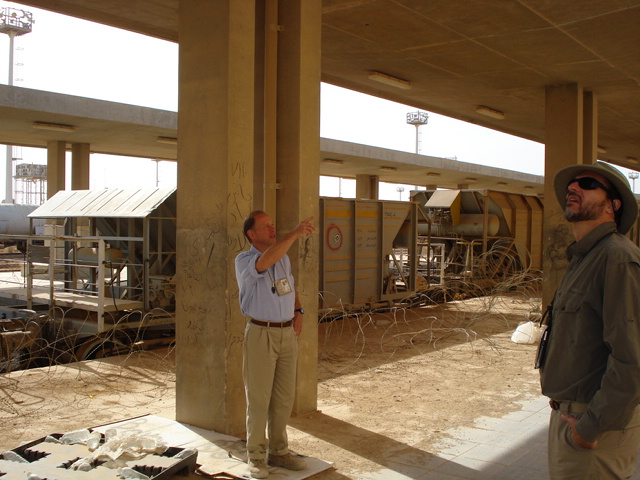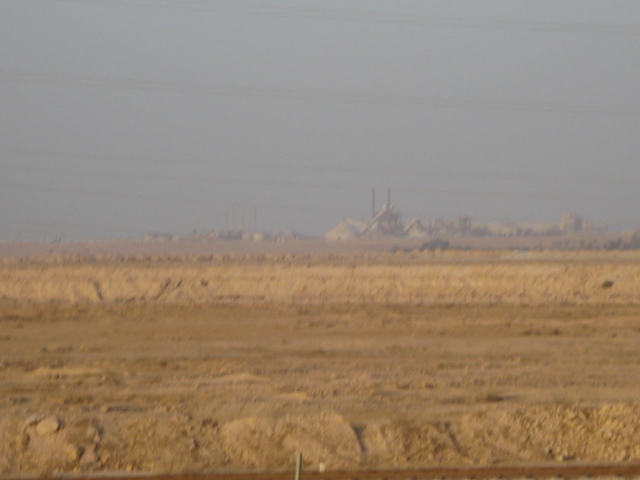
Remember in those 1960s TV SciFi shows & how they always featured a post-apocalyptic world that is not really so much destroyed as just devoid of people and busted up? I found a place where they can do remakes of those classics.
The Al Qaim train depot sits in the middle of a flat desert with tracks stretching to infinity in both directions. The building was new when it was abandoned because of the war; in fact I don’t think it was completed. Now it is quiet and empty, the vast cavernous inside space ruled by pigeons that spook when you come in, the sound of their wings echoing off empty tile walls.
I kept on waiting for an alien to step out from behind a pillar and cue the Outer Limits control voice: “There is nothing wrong with your television set. Do not attempt to adjust the picture. We are controlling transmission…” None showed up; all we heard were pigeons and the wind.

BTW – toward evening, I ran a little on the dirt road along the tracks that leads to the depot. The pigeons were sleeping, but I could hear the wild dogs howling in the distance. It gets dark fast around here. It was still very light when I started and almost dark 20 minutes later. I cut my run short because I hoped to avoid getting shot or torn apart by wild dogs. Neither of these things was a strong possibility, but these are the things you think about when it gets dark in a place like this. Besides, breaking a leg on the dark rough trail was a danger, so why take chances? This place really has all the needful things for a whole SciFi series.
The depot is structurally intact. It looks like what damage it suffered is superficial vandalism and neglect. It seems to me, since there is no town nearby that the whole place is vastly over engineered for its probable use, but maybe it was built with future growth in mind. When they built Dulles Airport, it was ridiculed for being in the middle of nowhere; today it is in the middle of a thriving business district. Some things take time to catch up.
The railroad was built to serve the local state-owned enterprises. There is a cement factory and a phosphate plant within distant sight of the depot (with a lot of desert in between). Farther down the tracks was/is a rail repair yard, currently occupied by the Marines. The rail line was supposed to move heavy materials produced at the plants, such as phosphate and cement to other parts of Iraq and markets in the Gulf and the Med. The passenger depot would bring in workers from other parts of Iraq and presumably take them back home when they could no longer tolerate life in the desert.

It was not a bad plan as far as central planning goes. Locating the phosphate and cement plants near sources of bulky raw materials made sense. Of course they were managed in the typical socialist way. That, coupled with local proclivities for flexible accounting methods, meant both facilities soon became massive boondoggles. With decent management and planning, however, this complex probably could make a profit and contribute something useful to Iraq’s future. The cement is good quality and there is a large unmet demand. (Producing cement, BTW, is energy intensive and releases prodigious amounts of CO2. You literally bake CO2 out of the rocks at high temperatures. Cement is not an eco-friendly building material, but there is not much wood around here. Maybe they should import eco-friendly southern pine.) I have to learn a little more about the phosphate plant before I have an opinion on it. I hear that it will not make as good an investment, so keep your checkbooks in your pockets for the time being.
It is a common misconception that every working factory is worth saving. Often the expense of rehab and various legacy costs associated with previous management give them zero or even negative value in comparison with starting from scratch in a green field (or in this case a brown heap of dirt). Sometimes the scrap value exceeds the working value, but who knows? Such decisions are beyond my pay grade. It might work out just fine. Maybe the train depot on at the edge of forever will not be forever empty.
